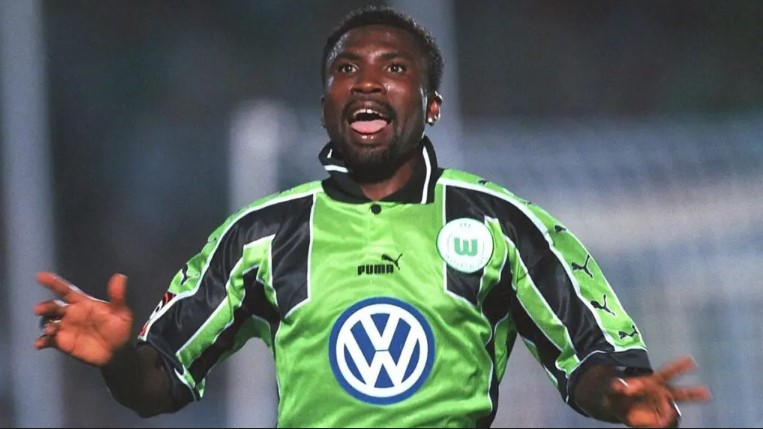Former Nigerian striker Jonathan Akpoborie recently shared an intriguing story about an unexpected call-up to the Super Eagles during a game against Togo, revealing the unusual circumstances that led to his appearance on the pitch. In an interview with Elegbete TV Sports, he recounted that he attended the match after enjoying a substantial meal of pounded yam at the residence of Honourable Nduka Irabor. Despite initially reluctance due to concerns about local fans inconveniencing him, he was eventually persuaded by Nduka to go to the stadium to watch the game, which turned out to be a pivotal moment in his career.
As he sat in the stands watching Nigeria trail 1-0 at halftime, Akpoborie was approached by a stranger who delivered a surprising message: Bonfrere Jo, the national team coach, wanted him to join the team. Akpoborie expressed his astonishment at this development, questioning how the coach had even known he was at the stadium. It became evident that Akpoborie’s presence had attracted attention, as there were calls from fans and officials to include him in the matchday squad, emphasizing the unpredictable nature of football and the passion surrounding the national team.
Despite having just finished a hearty meal, Akpoborie quickly complied and made his way to the dressing room, feeling a mix of excitement and urgency. In the dressing room, he found his football boots and jersey waiting for him, and despite his reservations stemming from his recent meal, he acknowledged the importance of answering the call of his country. He humorously noted that when Nigeria calls, “you can’t say no,” showcasing the deep sense of duty and pride that athletes often feel to represent their nation.
After preparing himself, Akpoborie successfully took to the field to contribute to the game, an experience that ultimately led him to further opportunities, including a trip to America with the national team after the match. This spontaneous call-up not only highlights Akpoborie’s readiness as an athlete but also underscores the unique situations that can arise in the world of sports, where last-minute decisions and unexpected opportunities can change the trajectory of a player’s career.
In addition to sharing his surprising call-up experience, Akpoborie also addressed lingering rumors regarding his exclusion from Nigeria’s 1996 Olympic football squad. There had been claims suggesting that tribal bias or internal cabals had influenced the team’s selection process. However, Akpoborie clarified that the situation was more complex than that. He pointed out that a key teammate, Kanu Nwankwo, was delayed due to heart surgery but remained an integral part of the squad, negating any notions of bias against him.
Furthermore, Akpoborie explained that the reason for his absence from the Olympic squad was not due to favoritism but rather a matter of team composition. Bonfrere Jo, the coach at the time, had specific overage players he wanted to keep on the roster: Uche Okechukwu, Emmanuel Amunike, and Daniel Amokachi. Akpoborie was considered a potential replacement should any of them sustain an injury before or during the competition. This revelation not only sheds light on the competitive nature of national team selection but also highlights Akpoborie’s understanding of the dynamics within the team, which is crucial for any aspiring athlete or football fan looking to grasp the complexities of international football.


